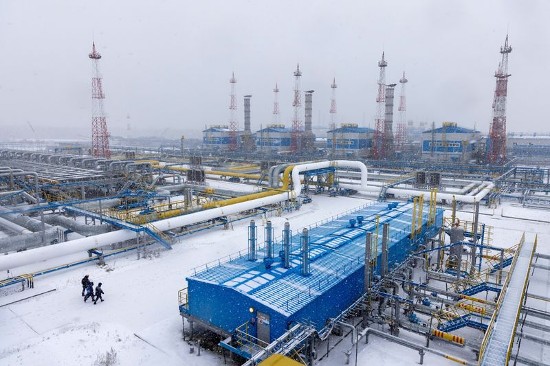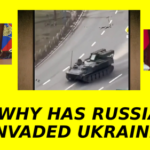When Vladimir Putin chose to take his revenge on Ukraine based on his peculiar interpretation of history, he also changed how the rest of us are going to fight climate change. In the short term, we will likely see no action to counter the existential global warming threat. For the longer term, Putin may have forced a speedup in Europe’s timeline to move from dependence on fossil fuels to renewable energy.
Putin sees the restoration of Mother Russia as his goal. His Mother Russia is delineated by the Baltic Sea coast and the eastern borders of Poland, Slovakia, Hungary and Romania. Putin’s Mother Russia contains Belarus and Ukraine which in his eyes have no historical legitimacy as nations. He feels the same about Estonia, Lithuania and Latvia. The pretext named is coming to the aid of Russian-speaking Eastern Ukrainians in the Donbas. The multifront assault bears no resemblance to a peacekeeping operation. It’s about crushing Ukraine as an independent nation.
By initiating this assault he has temporarily pushed Europe into reconsidering the decommissioning of many of its coal-fired thermal powerplants. His actions have also caused Europe to look elsewhere for gas and oil, places like North America, and the Middle East. Liquified natural gas will replace gas supplied over pipelines. Giant tankers will transit the oceans with their emissions contributing to atmospheric warming.
In a Politico article published on February 28th, Karl Mathiesen writes that war has become a giant distraction taking our collective eye off combatting climate change. The timing of the assault on Ukraine has pushed into the background the eye-opening report from the Intergovernmental Panel on Climate Change (IPCC) that describes just how far behind we are globally in implementing mitigating and adaptation strategies.
Mathiesen notes, “Whatever disorder we make in the world will ally itself with climate change and deplete our ability to respond to either.” He goes further describing the Ukraine and Russia as critical players in dealing with the fallout from climate change. Ukraine is a critical food exporter to countries in Africa where global warming is negatively impacting crop yields. And Russia is a petrostate that sees aggressive climate change mitigation as a threat to its economic wellbeing. Mathiesen notes that as the Russian invasion started it was the Ukrainian scientists working on the final IPCC draft who had to take shelter from Russian missile strikes while their attackers were still working on the language of the report inserting notes about positive benefits from global warming.
In a security conference held in Munich prior to Putin’s invasion, German attendees noted that depending on Russian oil and gas was making Europe as much a victim as Ukraine would be if it were attacked. They noted that finding alternative fossil fuel energy sources would be a short-term challenge and a distraction from dealing with the much greater long-term existential threat of climate change.
From reading the headlines on business pages in North American newspapers, it looks like fossil fuel producers are the winners here. The war is turning out to be a good thing as disruptive supply lines drive up prices. Regular unleaded gas at the pumps today here in Toronto was $1.95 CDN per litre ($5.77 US per gallon).
In the March 2nd New York Times, Somini Sengupta, the Times international climate correspondent, and Lisa Friedman, a federal climate and environment policy reporter stationed in Washington, wrote about Europe’s dependence on Russian fossil fuel sources. They quoted Kadri Simson, the European Union’s energy commissioner who said, “this war will have deep repercussions one way or another on our own energy system.” In the same article, the writers refer to John Kerry, the American climate czar, who called Putin’s action the weaponizing of fossil fuels. Kerry further stated that the climate effort will suffer. “It’s not what we want, it’s not going to be positive.”
In a March 7th article published in the State of the Planet, from the Columbia Climate School, Steve Cohen wrote:
“Europe is like a junkie trying to attack its favourite drug pusher.” His analogy is a good one when you think of how the EU is now invoking sanctions on Russia’s leaders and its energy sector. Cohen went on to state “in the near term, climate advocates are concerned because the war and need for Russia’s resources seem to have displaced climate change from the political agenda.” But he believes the short-term shift away from climate policy in face of this war is an appropriate tack and notes the need “to shift our focus from climate policy to trying to stop a murderous lunatic from destroying Ukraine and then possibly turning his attention to other nearby nations.”
Cohen cited environmental consequences to the war in his article stating, “The recklessness of the Russian invasion was never more apparent than last week’s attack and near destruction of the Zaporizhzhia nuclear power plant in southeastern Ukraine.” In his conclusion, he believed that ending the conflict sooner would allow us to “return to the long-term threat of global warming…For now, the people of Ukraine deserve our help, support, and prayers.”
How long can the world wait? Sea level rise, one of the many consequences of global warming, won’t abate without all of us making the effort to decarbonize. Mathiesen in his article asked us to consider the plight of the citizens of the Pacific island nation of Kiribati, who see any delay as existential. He wrote stating they “are building seawalls from broken coral because it’s all they have to fight the invading sea….and then what?”
Ending this Putin aggression and getting back to fighting climate change is critical. Every delay in implementing mitigation and adaptation strategies means the degrees of warming will continue to climb upward to and past 1.5 Celsius (2.7 Fahrenheit) that the IPCC says is our target ceiling. Exceeding 1.5 comes with escalating environmental, human, and financial costs. The world cannot afford to go there.
















